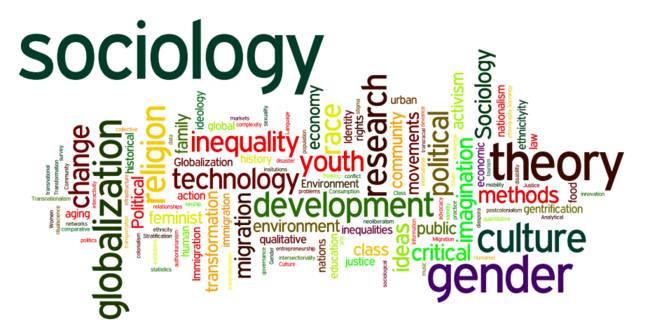Title: Sociology: Unraveling the Fabric of Society and Human Interactions
Introduction
Sociology, as a field of study, is the methodical exploration of society, human conduct, and the intricate network of relationships that mold our existence. Rooted in the quest to fathom the intricacies of social life, sociology has emerged as a pivotal area of academic pursuit, carrying profound implications for deciphering the functioning and evolution of societies. This essay aims to delve into the foundational principles and essential concepts of sociology, underscoring its significance in revealing the dynamics of human society.
I. The Historical Evolution of Sociology
The origins of sociology can be retraced to the Enlightenment period of the 18th century when thinkers like Auguste Comte, often hailed as the progenitor of sociology, aspired to apply scientific principles to the study of societal phenomena. Comte introduced the term "sociology" and advocated for grounding it in empirical observation and the scientific method. As time progressed, sociology crystallized into an independent realm of inquiry, with notable figures such as Karl Marx, Emile Durkheim, and Max Weber making profound contributions to its growth.
II. Fundamental Concepts in Sociology
Sociology encompasses a repertoire of fundamental concepts that underpin its examination:
Social Structure: Sociology scrutinizes the diverse components of social structure, including institutions (such as family, education, and religion), social hierarchies, and norms that shape human behavior and interrelations within a society.
Socialization: This concept delves into the process through which individuals are assimilated into their respective cultures and societies, acquiring values, beliefs, and behaviors in alignment with the prevailing social norms.
Social Change: Sociology investigates the mechanisms and catalysts propelling transformations in society, whether they stem from social movements, technological advancements, or economic shifts.
Social Inequality: The study of social inequality dissects disparities in wealth, power, and access to resources within a society, elucidating issues related to poverty, class, race, and gender.
Social Institutions: Sociology delves into the operations and repercussions of social institutions like the family, educational system, government, and religion, contemplating their influence on individuals and society as a whole.
III. Sociological Perspectives
Sociologists employ diverse theoretical perspectives to analyze and interpret social occurrences. Three salient perspectives encompass:
Structural-Functionalism: This viewpoint regards society as a multifaceted system with interconnected components working cohesively to sustain stability and equilibrium. It underscores the functions and contributions of varied institutions in preserving societal harmony.
Conflict Theory: Conflict theory centers on the power struggles and conflicts inherent in societal structures, highlighting the role of social inequality and competition for resources in propelling social change and upheaval.
Symbolic Interactionism: Symbolic interactionism scrutinizes the role of symbols and interactions in shaping individuals' perceptions and behaviors within society. It underscores the significance of shared meanings and symbols in social engagements.
IV. Methodology in Sociology
Sociologists employ an array of research methodologies to explore societal phenomena, encompassing:
Surveys: Surveys entail the collection of data from a sample of individuals through structured questionnaires or interviews, proffering insights into public opinion and attitudes across various domains.
Observations: Sociologists engage in participant observation or systematic observation to accrue data on social behavior within natural settings, often applied in the exploration of social interactions and norms.
Experiments: Experimental research enables sociologists to manipulate variables, examining hypotheses and establishing causal relationships within controlled settings.
Case Studies: Case studies entail in-depth exploration of a specific individual, group, or community to attain profound comprehension of particular social issues or phenomena.
V. Key Domains of Sociological Study
Sociology encompasses a profusion of subfields, each dedicated to dissecting distinct aspects of society. Some pivotal spheres of sociological exploration comprise:
Sociology of Gender: This domain delves into the social construction of gender roles, identities, and disparities, confronting issues concerning feminism, masculinity, and gender-based bias.
Sociology of Race and Ethnicity: Sociologists in this arena probe racial and ethnic interactions, dissecting topics such as racism, discrimination, and identity.
Sociology of Education: Education sociologists scrutinize the impact of educational systems on individuals and society, addressing concerns like educational access, inequality, and the part played by schools in socialization.
Medical Sociology: Medical sociology explores the social influences on health, healthcare systems, and the experience of illness.
Environmental Sociology: This subfield examines the interplay between society and the environment, with a focus on matters like environmental degradation, sustainability, and climate change.
Conclusion
Sociology stands as a pivotal arena of study, offering profound insights into the intricacies of human society. Built upon a rich legacy of intellectual exploration, sociology enables us to scrutinize and comprehend the structures, institutions, and interactions that mold our world. By employing a spectrum of theoretical perspectives and research methodologies, sociologists contribute not solely to academic knowledge but also to the amelioration of society by elucidating vital concerns encompassing inequality, social evolution, and the dynamics of human behavior. As we navigate the labyrinthine landscape of our interconnected globe, sociology remains an indispensable instrument for comprehending the forces steering societal development and transformation.


